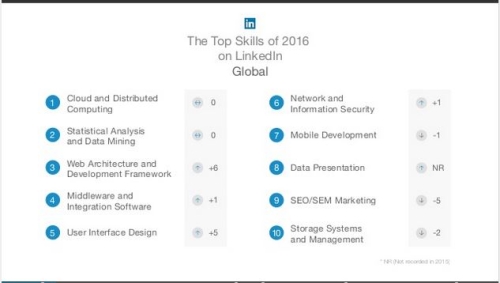"Top Skills" According to LinkedIn Analysis
LinkedIn analyzed recruiting activity on the site in 2016 and identified the top 10 skills employers want. A more accurate heading may be skills for which employers search. Not surprisingly, all are technology related.
I'm glad to see Data Presentation make the list; it's a core skill in our Management Communication classes at Cornell. LinkedIn's commentary expresses companies' growing interest well:
Show me, don't tell me: For the first time ever, data presentation, which is visualizing data, makes the list with the #8 spot. With statistical analysis and data mining holding strong again this year at #2, employers need employees who can organize data so it's easy for people to understand.
In addition to the overall number, LinkedIn identifies skills by country, and we seem interesting differences. A few non-technical skills emerge when we drill down:
- HR Benefits and Compensation (Australia, Brazil, UK)
- Corporate Law and Governance (Australia, France, Singapore, UAE)
- Business Development and Relationship Management (Brazil)
- Public Policy and International Relations (China, India, South Africa, UAE)
- Social Media Marketing (China)
- Business Intelligence (China)
- SEO/SEM Marketing (France, Germany, Ireland, Netherlands, Singapore, UAE, UK)
- Compliance and Employment Law (France)
- Marketing Campaign Management (France, Ireland, Singapore)
- Retail Store Operations (Germany)
- Channel Marketing (Germany)
- PR and Communications (India)
- Economics (India)
- Recruiting (Ireland, Netherlands)
- Foreign Language Translation (Singapore)
- Renewable and Sustainable Energy (UAE)
- Mining and Commodities (UAE)
Of course, many of these involve technology, but they are not as tech heavy as, say, algorithm design.
LinkedIn's analysis also indicates, "Demand for marketing skills is slowing because the supply of people with marketing skills has caught up with employers' demand for people with marketing skills."
Discussion Starters:
- What, if anything, surprises you about these lists? Consider the source: LinkedIn. Could some of the data be skewed?
- Looking at the list of non-technical skills, what conclusions do you draw about business and about supply and demand in those countries?
